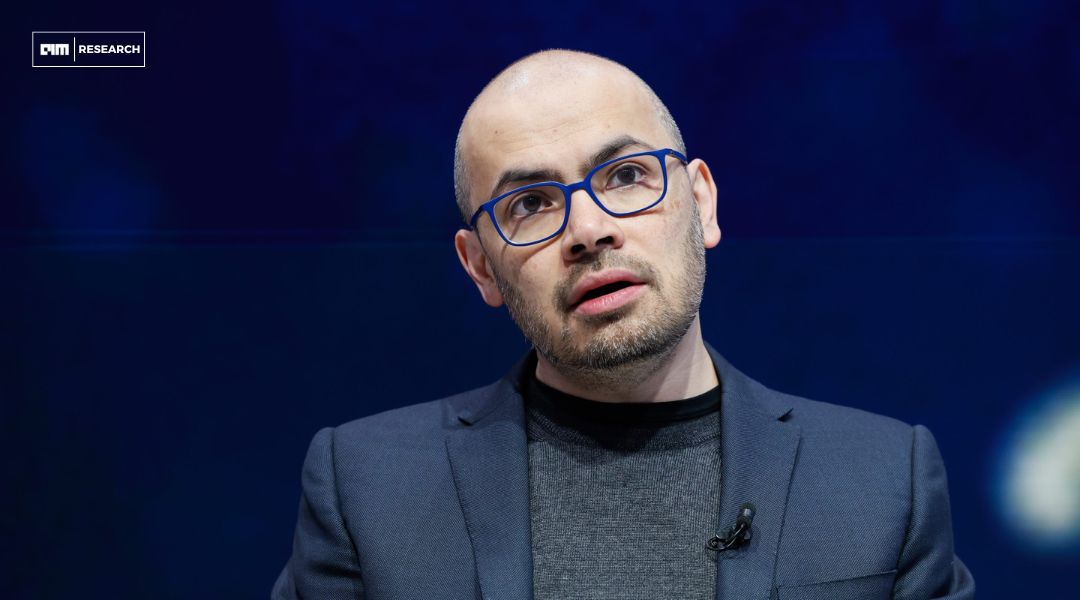
DeepMind Says AI Is the Microscope of the Future That Could End Disease
- By Anshika Mathews
- Published on
We want to build AI that can help scientists solve the hardest problems.


“The next big frontier for us is going to be disease,” said Demis Hassabis, CEO of Google DeepMind, in an April 20 interview with 60 Minutes. In a wide-ranging conversation with correspondent Scott Pelley, Hassabis said that artificial intelligence will soon help doctors diagnose illnesses earlier, predict conditions before they occur, and in some cases, prevent them entirely. “There’s a good chance we could cure many diseases, or prevent them entirely,” he said. “And this may happen within the next decade with AI.”
AlphaFold’s 2021 release was widely considered a breakthrough in structural biology, and according to Hassabis, the system has since predicted the shape of over 200 million proteins, the full set of known proteins on Earth.
“That’s every protein known to science,” Hassabis said. “It would’ve taken a billion years of PhD time to work out all those structures experimentally.” He argued that this foundational model has set the stage for more ambitious interventions, including the modeling of disease mechanisms and therapeutic pathways. “AI is now becoming the microscope of the future,” he said.
DeepMind originally published AlphaFold’s research in Nature and released the code and dataset freely, a move that was widely praised by the scientific community. The AlphaFold Protein Structure Database, built in collaboration with EMBL’s European Bioinformatics Institute (EMBL-EBI), now includes more than 200 million structures covering proteins from humans, animals, plants, bacteria, and other organisms.
But while DeepMind emphasized the public interest value of this work, Hassabis is now pointing to its broader medical significance. “One of our next big pushes is going to be applying these kinds of systems to understanding diseases,” he told 60 Minutes.
The company has not specified whether its disease research will be conducted under DeepMind or through Isomorphic Labs, a separate Alphabet subsidiary founded by Hassabis in 2021 to commercialize AI-driven drug discovery. Isomorphic Labs, which has operations in London and Lausanne, has already signed multi-year partnerships with pharmaceutical firms including Eli Lilly and Novartis, though details on those collaborations remain limited.
Hassabis said he believes AI will soon be capable of simulating complex biological processes beyond protein folding, including cell behavior and disease progression. These models could, in theory, allow researchers to pinpoint the onset of disease earlier and identify the most promising drug targets faster.
“Imagine being able to look at the very first changes in cells before a disease has really taken hold,” he said. “We could intervene earlier, maybe even prevent it.”
Hassabis did not suggest this capability was currently available, nor did he give a timeline for deployment beyond the general claim that progress may occur “within the next decade.” Nonetheless, he presented the research as a realistic application of current AI trajectory, not a speculative or long-term goal.
The segment received wide attention across the AI and biotech industries. Aravind Srinivas, co-founder and CEO of Perplexity AI, posted on X that Hassabis “should be given all resources in the world to make this happen,” calling him a “genius.” Hassabis replied to the post: “Thanks Aravind!”
Other researchers in the AI and biomedical space praised DeepMind’s commitment to fundamental science, contrasting it with the more product-driven approaches of commercial AI labs. DeepMind has released not only AlphaFold’s code and predictions but also its training methodology, allowing other teams to build on the system.
The 60 Minutes segment emphasized the breadth of DeepMind’s work, from reinforcement learning in games like Go and StarCraft to large-scale biology models like AlphaFold. Hassabis, who holds a PhD in cognitive neuroscience and has long described his interest in artificial general intelligence (AGI), has increasingly positioned DeepMind as a scientific AI lab rather than a consumer product company.
“We want to build AI that can help scientists solve the hardest problems,” he said. “That’s always been the goal.”
The interview included no references to AGI, competition with OpenAI, or comparisons to other large language model systems such as Gemini or ChatGPT. The focus remained squarely on biomedicine and the role of AI in accelerating empirical discovery.
While AlphaFold modeled static protein shapes, DeepMind’s next challenge lies in dynamic and multiscale modeling. That includes simulating how proteins interact in real biological environments, how diseases emerge from molecular disruptions, and how treatments may alter those processes.
Hassabis described this work as significantly more complex than structure prediction. “It’s one thing to predict a protein’s shape,” he said. “It’s another to model the entire system it operates in.”
DeepMind has previously published research on using AI for weather prediction, nuclear fusion control, and mathematics. Its biomedical ambitions appear to be the most concerted and long-term of these efforts, particularly with the establishment of Isomorphic Labs as a standalone business.
Neither DeepMind nor Alphabet has announced a product roadmap related to disease modeling. However, the 60 Minutes interview made clear that Hassabis sees this area as central to the lab’s mission in the years ahead.
“There’s so much we don’t understand about biology,” he said. “But AI is giving us a way to explore it, simulate it, and understand it faster than ever before.”
📣 Want to advertise in AIM Research? Book here >
Cypher 2024
21-22 Nov 2024, Santa Clara Convention Center, CA
A Vendor Briefing is a research tool for our industry analysts, and an opportunity for a vendor to present its products, services and business strategies to analysts who cover the vendor specifically or a related technology or market.
AIM Research encourages technology vendors and agencies to brief our team for PeMa Quadrants, when introducing a new product, changing a business model, or forming a partnership, merger, or acquisition.


